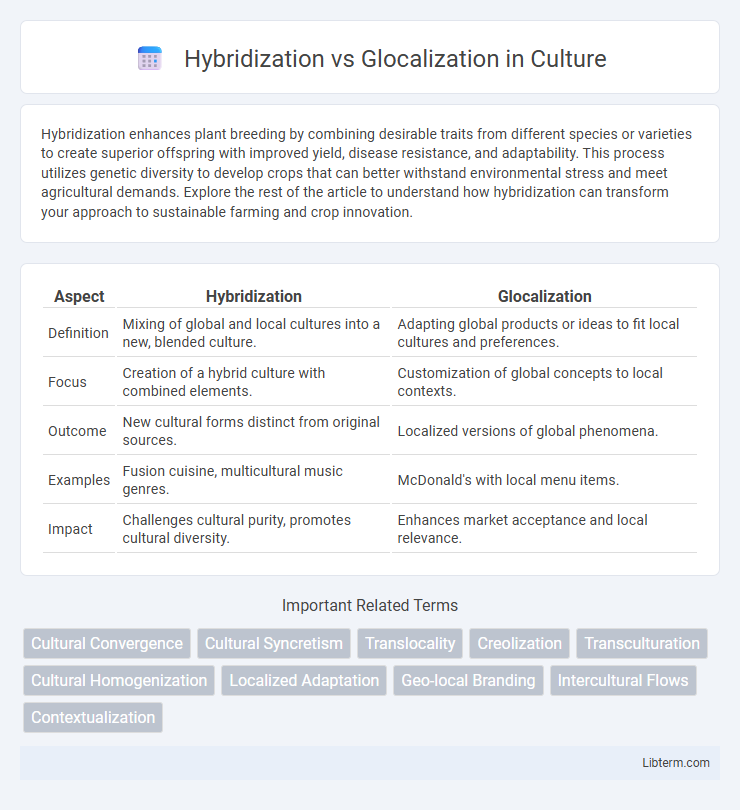Hybridization enhances plant breeding by combining desirable traits from different species or varieties to create superior offspring with improved yield, disease resistance, and adaptability. This process utilizes genetic diversity to develop crops that can better withstand environmental stress and meet agricultural demands. Explore the rest of the article to understand how hybridization can transform your approach to sustainable farming and crop innovation.
Table of Comparison
| Aspect | Hybridization | Glocalization |
|---|---|---|
| Definition | Mixing of global and local cultures into a new, blended culture. | Adapting global products or ideas to fit local cultures and preferences. |
| Focus | Creation of a hybrid culture with combined elements. | Customization of global concepts to local contexts. |
| Outcome | New cultural forms distinct from original sources. | Localized versions of global phenomena. |
| Examples | Fusion cuisine, multicultural music genres. | McDonald's with local menu items. |
| Impact | Challenges cultural purity, promotes cultural diversity. | Enhances market acceptance and local relevance. |
Defining Hybridization and Glocalization
Hybridization refers to the process where local and global cultural elements merge, creating new, blended identities and practices that transcend traditional boundaries. Glocalization describes the adaptation of global products or ideas to fit local contexts, emphasizing the simultaneous presence of global influences and local specificity. Both concepts highlight dynamic cultural interactions but differ in their focus on cultural fusion versus localized customization.
Historical Development of Both Concepts
Hybridization emerged from postcolonial theory in the late 20th century, emphasizing cultural mixing and the creation of new identities through globalization. Glocalization, rooted in economic and sociological studies from the 1980s, highlights the simultaneous global-local interaction where global products or ideas adapt to fit local contexts. Both concepts evolved to explain the complexities of cultural exchange and identity formation in an increasingly interconnected world.
Key Differences Between Hybridization and Glocalization
Hybridization involves the blending of global and local cultural elements to create new, syncretic forms, while glocalization refers to the adaptation of global products or ideas to fit local contexts and preferences. Hybridization emphasizes cultural mixing and transformation, whereas glocalization prioritizes strategic localization to enhance market relevance and consumer acceptance. The key difference lies in hybridization's focus on cultural fusion versus glocalization's focus on local adaptation within global frameworks.
Impacts on Cultural Identity
Hybridization reshapes cultural identity by blending global and local elements, creating new, dynamic cultural expressions that reflect diverse influences. Glocalization preserves cultural uniqueness by adapting global products or ideas to fit local traditions and values, reinforcing community identity while participating in a globalized world. Both processes impact cultural identity by balancing the tension between homogenization and cultural specificity, shaping how societies maintain heritage amidst globalization.
Examples of Hybridization in Today’s World
Hybridization manifests in today's global culture through phenomena like K-pop, which fuses traditional Korean music with Western pop and hip-hop elements, creating a unique genre with worldwide appeal. Culinary innovations such as Korean tacos blend Mexican street food with Korean flavors, reflecting cross-cultural exchange and adaptation. Fashion trends also exemplify hybridization by merging traditional motifs from indigenous cultures with contemporary styles, resulting in globally popular designs that honor heritage while embracing modernity.
Glocalization in Business and Marketing
Glocalization in business and marketing refers to the strategic adaptation of global products and brands to fit local cultures, preferences, and market conditions while maintaining a consistent global identity. This approach enhances customer engagement by addressing local tastes, regulatory requirements, and competitive landscapes, ultimately driving brand loyalty and market penetration. Unlike hybridization, which merges cultural elements into new forms, glocalization emphasizes tailoring global strategies to better align with specific local contexts.
Benefits and Drawbacks of Hybridization
Hybridization fosters cultural exchange and innovation by blending global and local elements, enhancing creativity and market adaptability for businesses. However, it risks diluting unique cultural identities and may lead to cultural homogenization, reducing diversity. The economic benefits include expanded consumer reach, but challenges arise in maintaining authenticity and managing conflicting values in multicultural settings.
Challenges Associated with Glocalization
Glocalization faces challenges such as balancing global brand consistency with local cultural nuances, which can lead to conflicting marketing strategies and diluted brand identity. Companies often struggle with adapting products and services to meet diverse consumer preferences while maintaining operational efficiency and cost-effectiveness. Furthermore, navigating varying legal, economic, and social regulations across regions complicates the implementation of glocalized strategies, increasing the risk of miscommunication and market resistance.
Hybridization vs Glocalization: Which Drives Greater Innovation?
Hybridization blends diverse cultural elements to create novel innovations by merging global influences, while glocalization adapts global products to fit local preferences, fostering innovation through customization. Hybridization accelerates cross-cultural creativity and ideation, promoting breakthrough innovations with broader appeal, whereas glocalization drives incremental innovation tailored to specific markets. Research indicates hybridization often leads to more radical innovation due to its integrative nature, whereas glocalization excels in enhancing product relevance and user experience within local contexts.
Future Trends in Global Culture: The Role of Both Concepts
Future trends in global culture highlight hybridization as a process blending diverse cultural elements to create novel, interconnected identities. Glocalization emphasizes adapting global phenomena to fit local contexts, fostering cultural specificity within global frameworks. Together, these concepts drive dynamic cultural evolution by balancing universal innovation with localized tradition.
Hybridization Infographic

 libterm.com
libterm.com